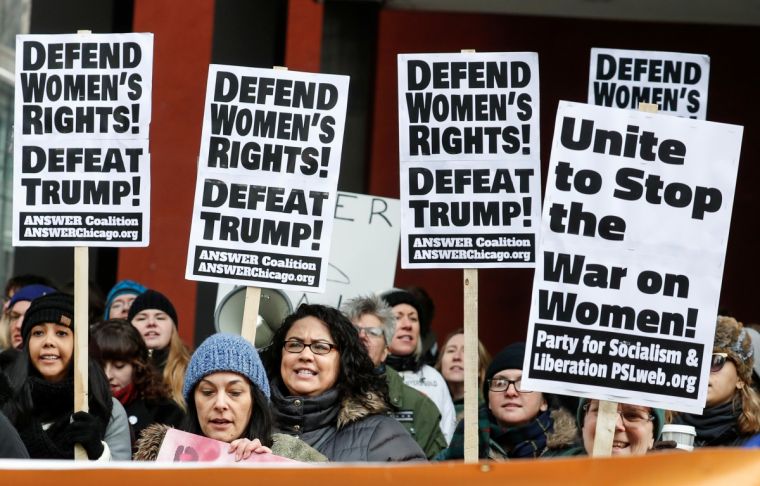Trump's Abortion Executive Order: What Is It And Will It Do More Harm Than Good?
Donald Trump on Monday signed a controversial executive order banning federal money going to international groups which perform abortions, or provide information about them.
In the week of the 44th anniversary of Roe v Wade, the land-mark 1973 Supreme Court decision that legalised abortion across the US, Trump signed the 'Mexico City Policy', named as such because President Reagan first implemented it at a United Nations population conference in Mexico City in 1984. The policy was abandoned under President Clinton, reinstated under George W Bush and revoked again under Barack Obama's administration.
Now it has been introduced again, requiring that non-governmental organisations receiving federal funding agree "neither [to] perform nor actively promote abortion as a method of family planning in other nations". The active promotion of abortions, in this case, means not only referrals but also counselling. The measure is thus also known by some as the "global gag rule".
So what exactly does the policy mean? And how is it likely to effect women on the ground?
To be clear: American taxpayers' money has never been used directly to fund abortions by international NGOs as the Helms Amendment, passed in 1973, prohibits the direct use of American funding for terminations.
But the Mexico City Policy goes further in blocking all funding to any organisation that carries out or promotes abortions in its development work, even if US money is not used directly for that purpose.
In other words: many health groups receive US assistance to provide women's services, while using different funding sources to provide abortion counselling and procedures. Those organisations will now have to stop providing abortions if they want to continue to receive US aid for their other programmes.
Trump's move has been welcomed by conservative groups and evangelical Christians.
Russell Moore, the president of the Southern Baptist Ethics & Religious Liberty Commission, said: "This decision will save lives...This is a welcome step in the right direction, and my hope is that the president will continue to defend human dignity and hold the predatory abortion industry accountable."
Alveda King, the evangelist and niece of civil rights campaigner Martin Luther King, also praised the new president. "The die is cast and the path is clear for America to learn that abortion is not health care," she said. "Abortion kills babies and all too often harms the wombs, health, psyche and souls of mothers. By reinstating the 'Mexico City Policy' which saves the lives of thousands of babies and women, President Trump is raising the bar for genuine concern for the lives and health of mothers and our children."
Elsewhere, campaigners reacted with delight over a move which will result in the 'defunding' of the pro-choice group International Planned Parenthood. Critics argue that among other areas, International Planned Parenthood assists the population control programme in Communist China. Reggie Littlejohn, the President of Women's Rights Without Frontiers said: "We are elated that US taxpayer dollars will stop going to International Planned Parenthood, which has been working hand in hand with the Chinese Communist Party in their brutal, coercive population control programme in China, which includes forced abortion and sterilisation of women."

But is the effect of the measure purely positive? Trump has been widely criticised since a photograph of him signing the order surrounded by a group of men went viral in the West, with feminists arguing that men were trying to control women's reproductive organs.
However, experts say that the real effect will be on the developing world, where the policy will freeze millions of dollars in funding that has gone to critical health treatment, including HIV testing and neonatal care, the Washington Post reports.
Some feminist critics to say that women "will die" as a result of the measure.
In Kenya for example, there are fears that fewer accessible abortions will result in an increased number of women resorting to dangerous methods for terminations, including drinking battery acid, using wire coat hangers and hiring local healers to stamp on their stomachs until the pregnancy is considered to be over.
"Trump's policy means even fewer services will be offered," said Chimaraoke Izugbara, a researcher at the African Population and Health Research Center (APHRC) in Nairobi. "Some women will not be reached, and providers may not be available to offer services. I think we are headed to a major disaster."
According to Izugbara, of the nearly 8,000 women who die in Kenya every year from complications caused by pregnancy and childbirth, at least a fifth of those deaths are caused by self-induced abortions.
Across Africa, around 1.6 million women are treated each year for complications from unsafe abortions, according to the Guttmacher Institute, a research organisation based in New York.
Meanwhile, International Planned Parenthood claims that its USAID funding goes towards contraceptives in Ethiopia, counselling for HIV/AIDS patients in Kenya and family planning services in Nepal. In a statement, the group said it "will not support policies which actively restrict or take away an individual's right to choose".
Away from the speculation, perhaps the best clue as to what will happen comes from past experience.
According to a report published in the Bulletin of the World Health Organization in 2011, when the policy was implemented under Bush, it actually led to "increases in abortion rates in sub-Saharan African countries".
One possible reason for the increase was that the policy in effect curtailed the activities of organisations that provided condoms and other birth-control methods, resulting in more unwanted pregnancies.
"The results were exactly the opposite as the intended effect of the policy," said Eran Bendavid, one of the researchers and an assistant professor of medicine at Stanford University.











